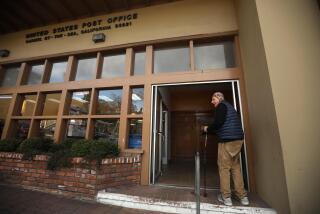Split or Overlay, the 411 on Area Codes Is Chaos
Area code chaos is sweeping California and is about to hit the San Fernando Valley. The familiar 818 area code is about to go the way of the eight-track tape--still functional but definitely inconvenient.
By next year, the Valley will be home to two area codes, by way of a geographic split or an overlay. And no one is very happy about it.
The telecommunications industry has recommended to the California Public Utilities Commission (PUC), the agency regulating the phone industry, that the Valley north and east of Van Nuys keep the 818 code. The entire western portion of the Valley would have a new area code.
The industry recommended a second option: a new area code, to overlay the entire 818 geography, that would be assigned to any new phone hookups. This would require 11 digit dialing for all calls, even to your next-door neighbor. The PUC has not decided which alternative it will impose, but it is certain that one or the other will take effect in July 2000.
Neither option is a good one. With the geographic split, half the people would have to undergo the upheaval of switching to a new area code. With the overlay, mandatory 11-digit dialing would be brutally inconvenient. For businesses, either option is costly and cumbersome.
My own Assembly district of 375,000 people soon will span five area codes: 323, 310, 424, 818 and the new Valley area code. If you thought road rage was scary, just wait until phone rage takes hold of the public psyche.
Just how did this situation get so out of control? Clearly, the popularity of cell phones, pagers, internet usage and fax technology have accelerated the demand for new phone lines far more quickly than anyone anticipated. But even with the exploding demand, basic mathematics shows this alone could not be the sole cause of the proliferation.
Consider: There are 7.9 million phone number combinations in one area code. Why then, will the San Fernando Valley, home to fewer than 1.5 million people, require a new area code? With approximately 180 million phone numbers allocated to California phone companies, and only 35 million of those in use today, how is it possible that so many new area codes are needed? Is there a legitimate shortage of numbers?
The answers are unclear, and that is why I have introduced the California Area Code Moratorium Act, Assembly Bill 818, with the goal of delaying the Valley’s area code change and others planned throughout the state until a better alternative can be developed. This legislation calls for a “time out” on area code proliferation so that policymakers and consumers can get to the bottom of what is driving this chaotic non-system, and push for more sensible alternatives.
Specifically, my legislation directs the PUC to:
* Develop a plan to meet the need for new phone lines that is less burdensome on consumers. A moratorium on new area codes would be in place while the plan was developed.
* Seek a waiver from the Federal Communications Commissionban on technology-based area codes. This would enable California to consider placing devices such as cell phones and pagers on their own area code. The FCC prohibits such technology-based area codes because they are considered discriminatory.
* Use existing numbers more efficiently by recycling out-of-service and disconnected numbers faster, and take other steps to prolong the life of existing area codes.
The telecommunications industry has an armada of lobbyists to defeat this bill. The current system has allowed it to avoid facing the difficult competitive and technical challenges that come with finding real solutions. It has worked to the industry’s advantage to have the public shoulder the burden of area code expansion, and it prefers to keep it that way. The industry stalled AB 818 it at its first hearing in the Utilities and Commerce Committee last Monday. We have one more chance at passage this Monday.
Whether the legislation passes or not, it has served to send a wake-up call to the PUC and the industry that the current system is dreadfully broken. Let’s hope our wake-up call got through on the first dial.


